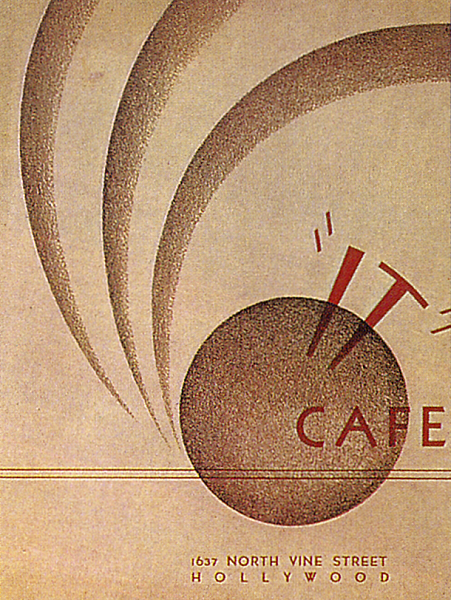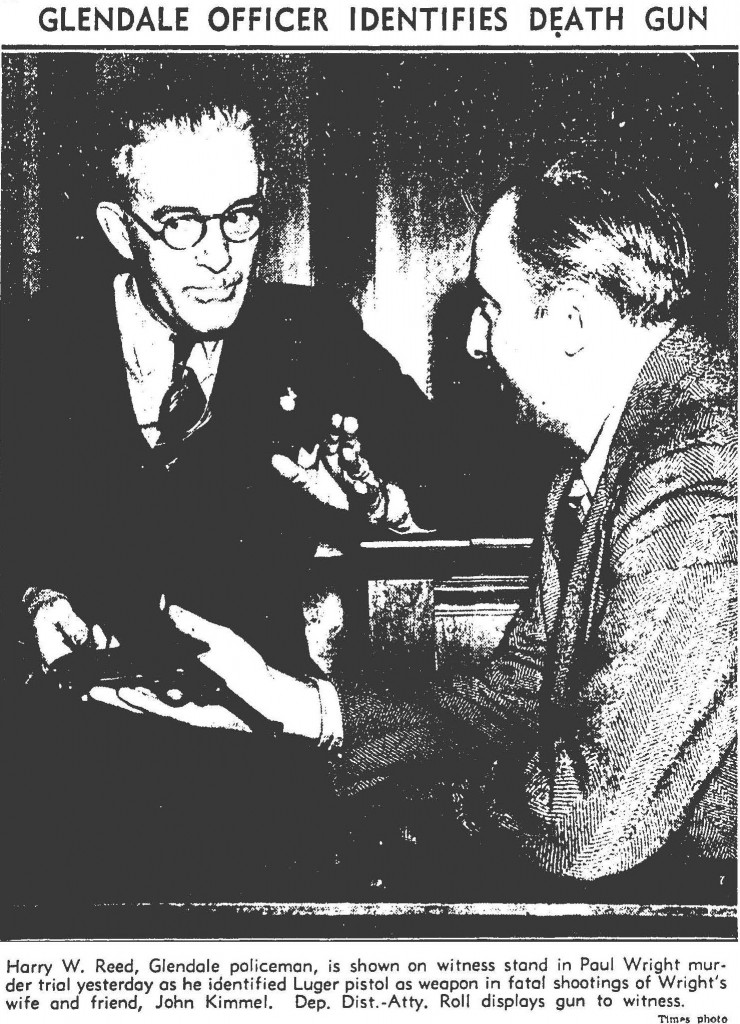In his opening statement in the trial of Paul Wright for double murder, defense attorney Jerry Giesler contended that Wright had no motive for murder until the sight of his wife and best friend in an unmentionable pose turned him into an unreasoning, raging avenger.
Giesler had conceived of a creative defense for his client — he said that Wright’s WWI service, during which he as gassed; a post-war tuberculosis attack, and a voluntary vasectomy combined to make him emotionally unstable, with more violent reactions to shock that normal men.
If the vasectomy defense failed Giesler had a Plan B, and he laid it out for the jury:
“When Wright strolled sleepily into his living room at 4 o’clock that morning, there was absolutely no reason for him to criminally and brutally kill.”
“What he saw there on the piano bench–which he will detail to you from this witness stand…that married man still there at 4 o’clock in the morning beside his beloved wife…that horrible situation was such an emotional shock that it rendered this defendant as unconscious as though he had been hit on top of the head with a tremendous mallet.”
“Under the written law of the State of California–not any so-called unwritten law–it is the plain duty of this jury to acquit Mr. Wright.”
The written law to which Giesler was referring is the crime of passion plea, known as the provocation defense. Historically, according to U.C. Berkeley’s School of Law, California defendants who have used the controversial plea have been able to reduce first and second degree murder charges down to manslaughter. Punishment has often been little or no jail time.
But would the defense strategy work for Wright? The prosecution produced evidence that had Wright sitting on his bed brooding, before arranging a chair in front of a mirror so that he could get a full view of his wife and best friend in a passionate embrace on the piano bench.
Giesler called witnesses to the stand who related a fairy-tale like courtship between Paul and Evelyn, resulting in a blissful marriage — at least for the first couple of years.
In 1936 Paul confided in a close friend that:
“I’m worried to the point of distraction. I’ve earned a fair salary ever since we have been married, but there doesn’t seem to be enough for the household and her demands.”
“I’ve always paid the bills, and it breaks my heart to see my credit go like this.”
I’ve done everything in my power to make her happy–even had myself sterilized, but it seems to be no use.”
The vasectomy had cost Paul one of his most cherished dreams — he’d always wanted a son, and that was never going to be possible for him.
Giesler continued to hammer home the impact of Paul’s “sex sacrfice” which the attorney
contended had destroyed Wright’s self-control when he found Evelyn and John in an intimate pose. Dr. Charles B. Huggins, a Chicago surgeon, described the vasectomy performed on Wright to save Evelyn from the danger of again becoming a mother. She’d nearly lost her life giving birth to Helen and a sterilization operation on her would have been much more dangerous.
From the witness stand, under Giesler’s skilled interrogation, Paul Wright gave his version of the events leading up to the double murder.
 Paul said that he and John had attended a club meeting, then gone out for a nightcap. By 2 a.m. they were at Clara Bow’s “It Cafe” preparing to go home. It was Paul who suggested that John accompany him home, ostensibly to provide back-up when Evelyn questioned him about where, and with whom, he’d spent the evening and early morning hours.
Paul said that he and John had attended a club meeting, then gone out for a nightcap. By 2 a.m. they were at Clara Bow’s “It Cafe” preparing to go home. It was Paul who suggested that John accompany him home, ostensibly to provide back-up when Evelyn questioned him about where, and with whom, he’d spent the evening and early morning hours.
Paul went on to describe feeling fatigued and going to the bedroom for a nap. He told the hushed courtroom:
“I was awakened by some sort of sound–like the piano. It started me up out of my sleep. I went to the living room door and saw that the lights were still on. Johnny was sitting at the piano. I could just see his head. He was looking downward. I couldn’t see Evelyn and I wondered where she was.”
I thought she was on the davenport and I looked, but she was not there. I thought she was in the kitchen. Then I turned–then I turned–I saw Evelyn on the piano bench with Johnny…They embraced and kissed each other.”
“Everything inside me exploded!” he shouted.
“Next thing I knew I was standing there with the gun in my hand. She was on the floor–Johnny was moaning. They were covered with blood.”
It wasn’t possible to know what the jury thought about what they’d heard, but a reporter for the L.A. Times was clear about how Wright had conducted himself: “Seldom in local court annals has a defendant appeared to such good advantage defending himself on the witness stand.”
However the report wasn’t all admiration, Wright was accused of having “robbed his wife’s grave of decency and fidelity” in his attempt to save his own life. And the report went on with: “Johnny Kimmel, by inference was branded a depraved scoundrel by the man who killed him.”
Of course the only people whose opinions mattered were sitting in the jury box.
 Wright emotionally and physically collapsed under Deputy D.A. Roll’s blistering cross-examination, and his earlier testimony started to come unraveled. He had maintained that he’d shot blindly at the pair from the bedroom doorway, but changed his story by declaring that when he pumped the final rounds into the two bodies he was standing with his gun in his hand beside the piano.
Wright emotionally and physically collapsed under Deputy D.A. Roll’s blistering cross-examination, and his earlier testimony started to come unraveled. He had maintained that he’d shot blindly at the pair from the bedroom doorway, but changed his story by declaring that when he pumped the final rounds into the two bodies he was standing with his gun in his hand beside the piano.
Also, little details began to surface about exactly what Paul had witnessed that had provoked him to commit double murder. Kimmel was immediately visible on the piano bench, but Evelyn was not.
Deputy D.A. Roll asked Wright:
“Was it in your mind that they had committed some unnatural act?”
To which Wright answered:
“Yes, it must have been.”
At last the prosecution was getting to the the truth of what Wright had seen. Evelyn wasn’t on the piano bench next to Johnny, she was in front of him on her knees! That explains Wright’s violent reaction a little better than what had at first been represented as a kiss and an embrace. From the beginning, Wright’s story made him sound like a Victorian husband who had stumbled upon his wife and a companion in a relatively innocent lip lock — an act which should have merited nothing more than a shout demanding to know what the hell was going on.
Wright also admitted that he didn’t know whether he’d disarranged the clothing of his victims in the manner that they were found later by police!
Sounds to me like Wright had the presence of mind to set the scene of the crime to match his later statements to the cops. How would his conflicting testimony sound to the jury?
NEXT TIME: The verdict and aftermath of Paul Wright’s case.

![Paul Wright in court. [Photo courtesy of UCLA digital collection.]](https://derangedlacrimes.com/wp-content/uploads/2013/05/paul-wright_ucla-collection.jpg)